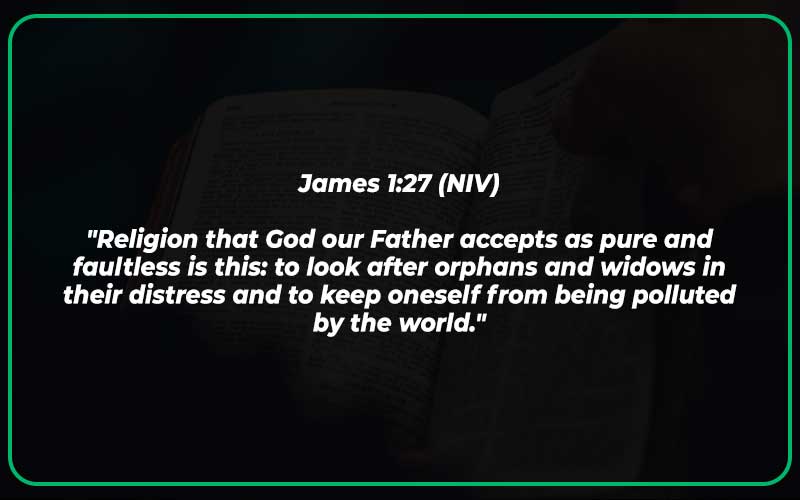In a world that can sometimes feel cold and self-centered, acts of kindness and caring for others hold great importance. The Bible is full of teachings and examples that emphasize the value of showing love and compassion to those around us.
Join me as we explore inspiring Bible verses about caring for others, discovering how these words of wisdom can inspire us to make a positive impact in the lives of those we encounter. Together, let’s uncover the beauty and power of selflessness found within the scriptures.
Also Read: Bible Verses About Alcohol
Bible Verses About Caring For Others
1 John 3:17-18
“But if anyone has the world’s goods and sees his brother in need, yet closes his heart against him, how does God’s love abide in him? Little children, let us not love in word or talk but in deed and in truth.”
John urges believers to move beyond simply speaking about love and actually demonstrate it through their actions. This includes caring for those who are in need and have less than we do, as it would indicate the presence of God’s love in our hearts.
Galatians 6:2
“Bear one another’s burdens, and so fulfill the law of Christ.”
Paul teaches that part of fulfilling Christ’s law includes bearing one another’s burdens, which refers to sharing in the difficulties and struggles of others. As believers, we are called to be compassionate and help those in need.
Matthew 25:35-36
“For I was hungry and you gave me food, I was thirsty and you gave me drink, I was a stranger and you welcomed me, I was naked and you clothed me, I was sick and you visited me, I was in prison and you came to me.”
In this parable, Jesus teaches that when we care for those who are hungry, thirsty, or in need, we are actually caring for Him. This serves as a reminder that caring for others is not just a good deed, but a direct reflection of our love for God.
Proverbs 19:17
“Whoever is generous to the poor lends to the Lord, and he will repay him for his deed.”
Proverbs teaches that when we are generous to those who are in need, we are actually lending to the Lord and will be rewarded for our deeds. It encourages believers to be generous and compassionate towards others, as God sees and will return the kindness shown to them.
James 2:15-16
“If a brother or sister is poorly clothed and lacking in daily food, and one of you says to them, ‘Go in peace, be warmed and filled,’ without giving them the things needed for the body, what good is that?”
James rebukes those who only offer words of comfort without also providing the tangible help that is needed. It serves as a warning against being all talk and no action when it comes to caring for others.
Romans 12:10
“Love one another with brotherly affection. Outdo one another in showing honor.”
Paul encourages believers to love one another with a deep brotherly affection, expressing honor and care towards each other. This verse highlights the importance of actively showing care and concern for others, and even competing to do so in an honorable way as God’s children.
Proverbs 14:31
“Whoever oppresses a poor man insults his Maker, but he who is generous to the needy honors him.”
Proverbs teaches that oppressing the poor is not only morally wrong, but also an insult to God who made us all. Conversely, being generous to the needy is a way of honoring God and reflecting His love towards others that are made in His image.
Philippians 2:4
“Let each of you look not only to his own interests, but also to the interests of others.”
Paul instructs believers to not only care for their own needs, but also to actively look and care for the interests of others. This selflessness is an important aspect of caring for others, and is reflective of Jesus’ own example of putting others first.

Proverbs 3:27-28
“Do not withhold good from those to whom it is due, when it is in your power to do it. Do not say to your neighbor, ‘Go, and come again, tomorrow I will give it’—when you have it with you.”
Proverbs warns against withholding good from those who need it if it is in our power to help. It teaches us to not procrastinate when helping others, but to respond quickly and generously when we are able.
Isaiah 58:10
“If you pour yourself out for the hungry and satisfy the desire of the afflicted, then shall your light rise in the darkness and your gloom be as the noonday.”
Isaiah teaches that when we selflessly care for those who are hungry and afflicted, it brings light to our own lives and dispels darkness. It encourages us to see caring for others as something that also benefits ourselves and brings us closer to God.
Mark 12:31
“The second is this: ‘You shall love your neighbor as yourself.’ There is no other commandment greater than these.”
Jesus’ commandment to love our neighbors as ourselves serves as a reminder of the high importance of caring for others. It emphasizes the value of treating others the way we would like to be treated in return, which is a reflection of God’s own love.
Luke 6:38
“Give, and it will be given to you. Good measure, pressed down, shaken together, running over, will be put into your lap. For with the measure you use it will be measured back to you.”
Luke reminds us that when we give generously to others, we will be blessed with an abundance in return. It encourages a spirit of giving and generosity as well as demonstrating our faith in God’s provision for us as we care for others.
1 Peter 4:8-10
“Above all, keep loving one another earnestly, since love covers a multitude of sins. Show hospitality to one another without grumbling. As each has received a gift, use it to serve one another, as good stewards of God’s varied grace.”
Peter exhorts believers to keep their love for one another strong and to show hospitality and service towards each other. It emphasizes the role of using individual gifts to serve others, affirming the importance of caring for others in the body of Christ, resulting in the covering of sins and promoting unity within the community of faith.
1 Timothy 5:3-4
“Honor widows who are truly widows. But if a widow has children or grandchildren, let them first learn to show godliness to their own household and to make some return to their parents, for this is pleasing in the sight of God.”
Paul teaches that honoring and caring for widows is pleasing to God. It also highlights the importance of prioritizing the care and responsibility for one’s own family, as they are the first ones to show godliness. This verse shows the importance of caring for those who cannot care for themselves as well as for our own households.
Acts 20:35
“In all things I have shown you that by working hard in this way we must help the weak and remember the words of the Lord Jesus, how he himself said, ‘It is more blessed to give than to receive.’”
Paul reminds us of Jesus’ words that it is more blessed to give than to receive. This verse emphasizes the importance of working hard to help those who are weak and in need, highlighting the true joy that caring for others brings.
Hebrews 13:16
“Do not neglect to do good and to share what you have, for such sacrifices are pleasing to God.”
Hebrews exhorts believers to not neglect doing good and sharing what they have with others. It highlights the value of caring for others as a sacrifice that is pleasing to God, emphasizing the importance of actively showing care and compassion towards others.
2 Corinthians 1:3-4
“Blessed be the God and Father of our Lord Jesus Christ, the Father of mercies and God of all comfort, who comforts us in all our affliction, so that we may be able to comfort those who are in any affliction, with the comfort with which we ourselves are comforted by God.”
Paul teaches that the comfort we receive from God amidst afflictions should motivate us to comfort others who are also in affliction. This verse highlights the importance of giving back to others in response to the comfort and care we have received from God.

What does the Bible say about caring for others?
The Bible is rich with teachings about caring for others, emphasizing the importance of love, compassion, and selflessness. Throughout its various books and verses, the message of caring for others is woven into the core of its teachings. This article explores what the Bible says about caring for others, love, and caring for strangers.
What does the Bible say about love and care for others?
The central theme of love and care for others is best summarized in the New Testament, particularly in the teachings of Jesus Christ. One of the most well-known passages in the Bible that addresses this is found in the Gospel of Matthew:
Matthew 22:37-39 (NIV)
37 Jesus replied: “‘Love the Lord your God with all your heart and with all your soul and with all your mind.’ 38 This is the first and greatest commandment. 39 And the second is like it: ‘Love your neighbor as yourself.’
This passage highlights the two greatest commandments in Christianity – to love God wholeheartedly and to love one’s neighbor as oneself. The command to love one’s neighbor encompasses caring for others in various aspects of their lives, including physical, emotional, and spiritual needs.
The Good Samaritan
To further emphasize the importance of caring for others, Jesus told the parable of the Good Samaritan:
Luke 10:30-37 (NIV)
30 In reply Jesus said: “A man was going down from Jerusalem to Jericho when he was attacked by robbers. They stripped him of his clothes, beat him and went away, leaving him half dead. 31 A priest happened to be going down the same road, and when he saw the man, he passed by on the other side. 32 So too, a Levite, when he came to the place and saw him, passed by on the other side. 33 But a Samaritan, as he traveled, came where the man was; and when he saw him, he took pity on him. 34 He went to him and bandaged his wounds, pouring on oil and wine. Then he put the man on his own donkey, brought him to an inn and took care of him. 35 The next day he took out two denarii and gave them to the innkeeper. ‘Look after him,’ he said, ‘and when I return, I will reimburse you for any extra expense you may have.’
In this parable, Jesus teaches that caring for others should be unconditional and not limited by social, ethnic, or religious boundaries. The Good Samaritan’s actions exemplify selfless love and care for a stranger in need.
Acts of Kindness and Generosity
The Bible encourages believers to practice acts of kindness and generosity towards others. Several verses emphasize the importance of helping those who are less fortunate:
Proverbs 19:17 (NIV)
17 Whoever is kind to the poor lends to the Lord, and he will reward them for what they have done.
Galatians 6:2 (NIV)
2 Carry each other’s burdens, and in this way, you will fulfill the law of Christ.
1 John 3:17-18 (NIV)
17 If anyone has material possessions and sees a brother or sister in need but has no pity on them, how can the love of God be in that person? 18 Dear children, let us not love with words or speech but with actions and in truth.
These verses underscore the importance of actively caring for others and extending a helping hand to those in need.
What does the Bible say about caring for strangers?
Caring for strangers is a recurring theme in the Bible, emphasizing the idea of hospitality and compassion for those who are not familiar to us. In the Old Testament, God’s people were specifically commanded to care for strangers:
Leviticus 19:33-34 (NIV)
33 When a foreigner resides among you in your land, do not mistreat them. 34 The foreigner residing among you must be treated as your native-born. Love them as yourself, for you were foreigners in Egypt. I am the Lord your God.
This passage highlights the need to treat strangers with kindness and love, remembering that the Israelites were once strangers in a foreign land.
The Widows and Orphans
Caring for widows and orphans is another aspect of showing love and compassion to those in need:
James 1:27 (NIV)
“Religion that God our Father accepts as pure and faultless is this: to look after orphans and widows in their distress and to keep oneself from being polluted by the world.”
This verse from the New Testament underscores the importance of caring for the most vulnerable members of society, such as widows and orphans, demonstrating God’s heart for the marginalized and the suffering.

The Reward of Caring for Others
The Bible also assures believers that their acts of caring for others will not go unnoticed, and they will be rewarded:
Matthew 25:35-40 (NIV)
35 For I was hungry, and you gave me something to eat; I was thirsty, and you gave me something to drink; I was a stranger, and you invited me in; 36 I needed clothes, and you clothed me; I was sick, and you looked after me; I was in prison, and you came to visit me.’
37 “Then the righteous will answer him, ‘Lord, when did we see you hungry and feed you or thirsty and give you something to drink? 38 When did we see you a stranger and invite you in or needing clothes and clothe you? 39 When did we see you sick or in prison and go to visit you?’
40 “The King will reply, ‘Truly I tell you, whatever you did for one of the least of these brothers and sisters of mine, you did for me.’
This powerful passage from the Gospel of Matthew conveys the idea that when believers care for others, especially those in need, they are doing it for Christ Himself, and their acts of compassion will be rewarded.
Conclusion
The Bible consistently emphasizes the importance of caring for others, showing love, compassion, and hospitality towards strangers, widows, orphans, and the marginalized.
The teachings of Jesus Christ, along with various verses from both the Old and New Testaments, encourage believers to embody selfless love and actively demonstrate their care for those around them.
As believers put these teachings into practice, they not only fulfill the commandments of God but also contribute to creating a more compassionate and loving society where everyone is treated with dignity and respect.
Throughout history, individuals and communities inspired by the Bible’s teachings have founded charities, established humanitarian missions, and undertaken acts of kindness to care for others, leaving a profound impact on the world.
As we continue to explore the depths of the Bible’s wisdom and integrate its teachings into our lives, the call to care for others remains a timeless and enduring message that transcends cultures, ages, and beliefs, offering hope and guidance for generations to come.

